Master the French Past Tenses
A practical guide to the French past verb tenses: le passé composé and l’imparfait.
I want to learn...
Curious about what the French past tense looks like? Welcome to French for beginners. Even though we’re often told not to live in the past, it’s time to embrace it! For our French language learning purposes, we’ll be embracing the past tense in French.
Anyone wanting to know more about how to speak French will want to work towards mastering French grammar. And in addition to French adjectives and French articles, a working knowledge of French verb tenses is très important (very important)!
The passé composé is one of the first past tenses you should learn in French. It is used to speak about completed past actions. But we will also be looking at the imparfait, which is used to describe the context of a story (the weather, the people, the place etc.) and to talk about regular actions that have happened in the past.
French grammar has a reputation for being difficult, but in this article we’ll break down each of the tenses and explore the essentials for forming and using both of these French past tenses.
The basics of le passé composé
The passé composé is used to talk about specific actions completed in the past. It might make it easier for you to think of it as being similar to the English simple past or the present perfect tenses.
The passé composé is a compound verb tense. It is made up of two parts: the auxiliary (or helping) verb. The auxiliary is always either the present conjugated form of avoir (to have) or être (to be).
-
AVOIR: J’ai trainé à la maison. (I idled around at home.)
-
ÊTRE: Je suis allé au restaurant. (I went to the restaurant)
Verbs (-er, -ir, -re)
- For -er verbs, we replace the -er with é (manger - mangé)
- For -ir verbs, we replace the -ir with -i (finir - fini)
- For -re verbs, we replace the -re with -u (vendre - vendu)
Negation
To form the negative, use the following structure:
subject + n’ + avoir in the present + pas + the past participle
For example:
- Je n’ai pas choisi ce restaurant (I didn’t choose this restaurant).
Verbs with être in the passé composé
Most verbs in the passé composé use avoir, but in addition to all reflexive verbs, there are 13 verbs involving movement that use être. There is an acronym that can make it easier to remember them and it’s M.VANDERTRAMPS
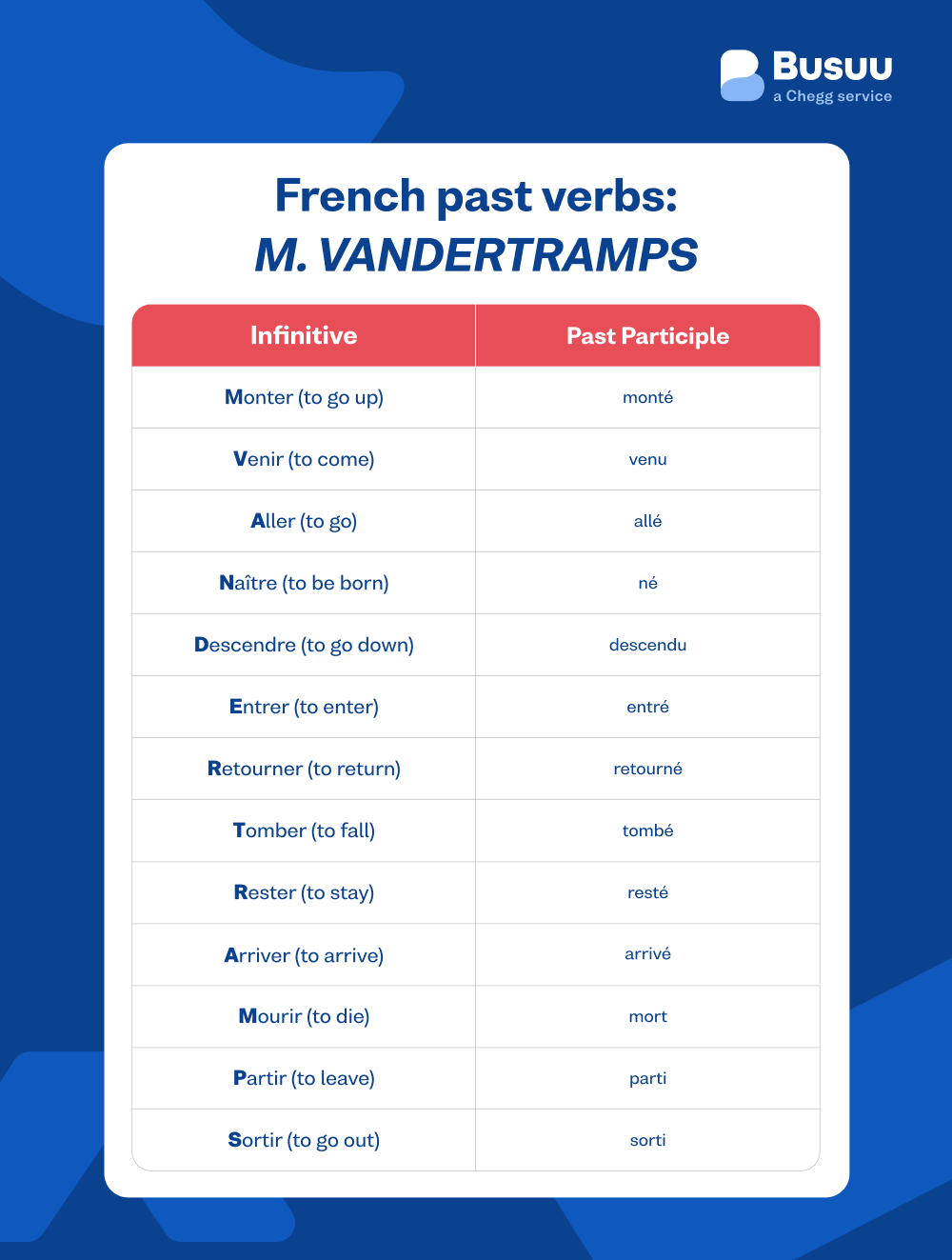
M. VANDERTRAMPS: A great way to help you remember 13 key verbs
| Infinitive | Past Participle |
|---|---|
| Monter (to go up) | monté |
| Venir (to come) | venu |
| Aller (to go) | allé |
| Naître (to be born) | né |
| Descendre (to go down) | descendu |
| Entrer (to enter) | entré |
| Retourner (to return) | retourné |
| Tomber (to fall) | tombé |
| Rester (to stay) | resté |
| Arriver (to arrive) | arrivé |
| Mourir (to die) | mort |
| Partir (to leave) | parti |
| Sortir (to go out) | sorti |
Remember that verbs with être in the passé composé, add -e when a woman is speaking and / or -s if there is more than one person speaking. The good news? No matter how you write it, you’ll almost always pronounce it the same way!
See examples below:
- Il est sorti. (He went out.)
- Elle est sortie. (She went out.)
- Ils sont sortis. (They (masculine) went out.)
- Elles sont sorties. (They (feminine) went out.)
The passé composé and irregular verbs
There are a few verbs that have irregular past participles, meaning they don’t follow the same rules that we covered above. Unfortunately, there are no rules for forming past participles for irregular verbs — you just have to memorize them!
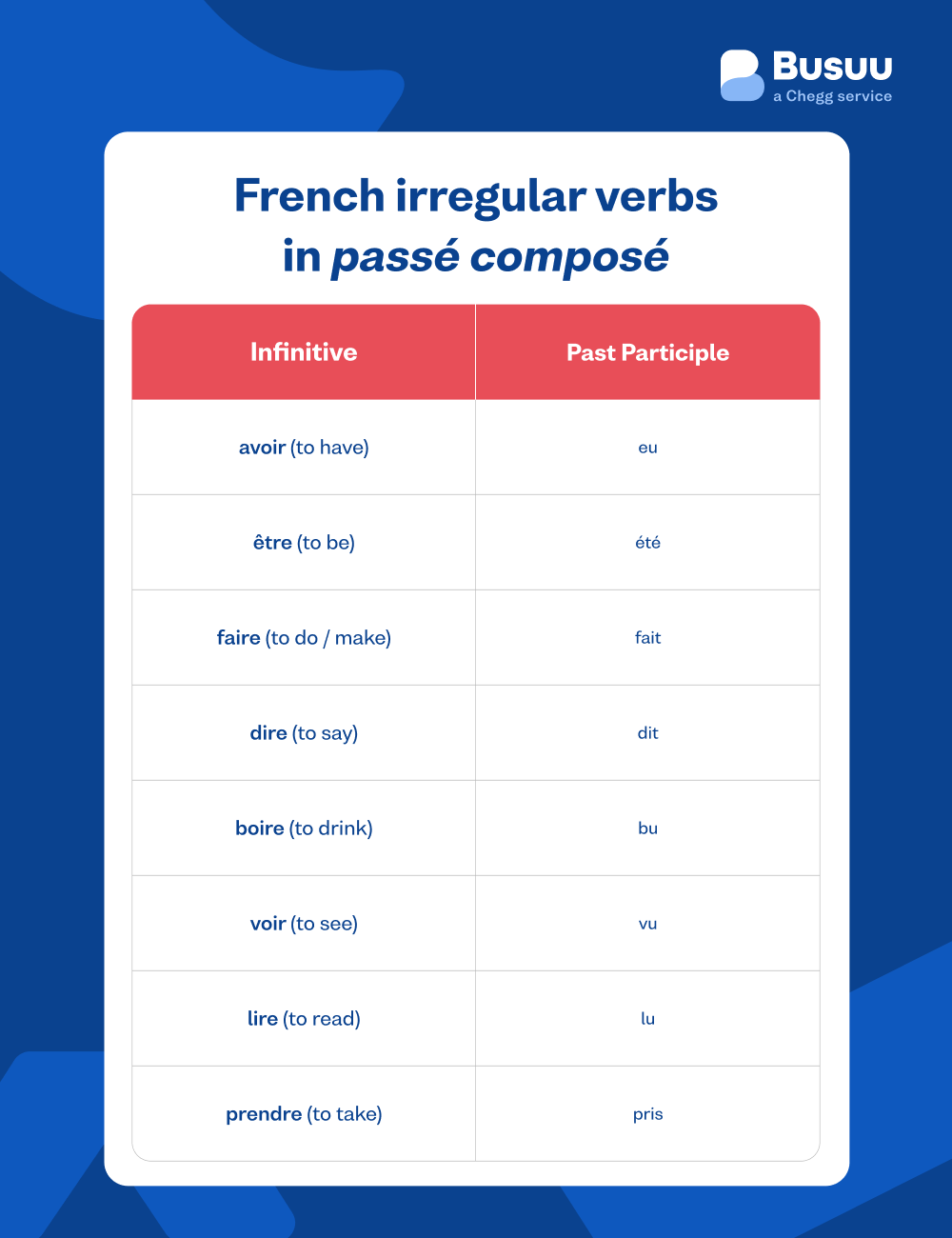
French irregular verbs in passé composé
| Infinitive | Past Participle |
|---|---|
| avoir (to have) | eu |
| être (to be) | été |
| faire (to do / make) | fait |
| dire (to say) | dit |
| boire (to drink) | bu |
| voir (to see) | vu |
| lire (to read) | lu |
| prendre (to take) | pris |
The basics of the imparfait
L’imparfait means “the imperfect” and it describes states or actions that were ongoing or repeated in the past. It might make it easier for you to think of the imparfait as being similar to the English simple past tense, structures such as used to or would, and even the past progressive tense. It’s used to tell stories and report on past events.
Unlike the passé composé, the imparfait doesn’t use an auxiliary verb. Instead, verbs are conjugated with different endings than the present tense.
Forming the imparfait: Verb stems and endings
For the majority of verbs, the imparfait is formed the same way, which means that the stems are predictable. In order to find the imparfait verb stem, you take the present tense first person plural (i.e., the nous form) and drop the -ons ending, before adding on the imparfait ending. With the verb vivre, you would take viv and the ending that corresponds to the subject pronoun.
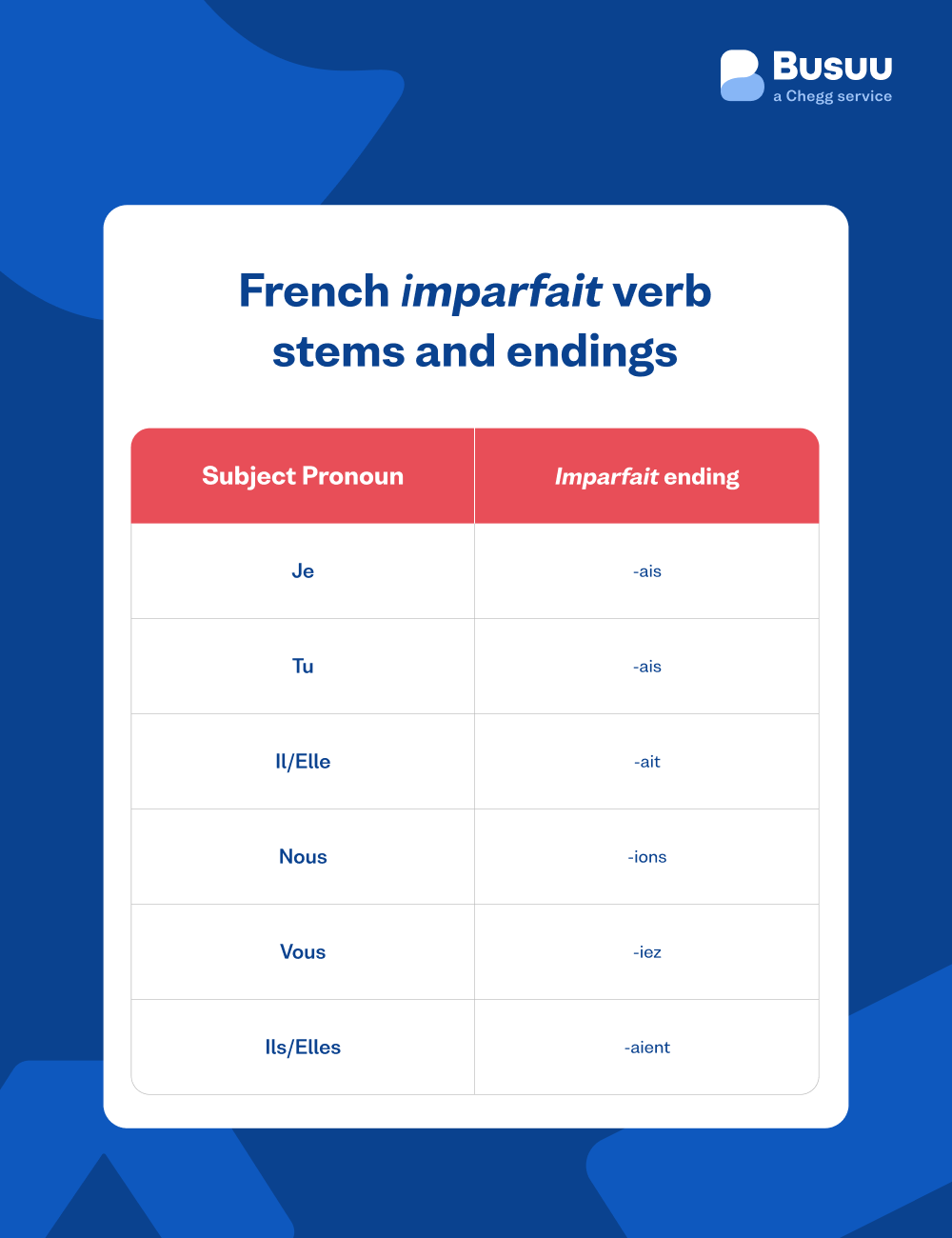
French imparfait verb stems and endings
| Subject Pronoun | Imparfait Ending |
|---|---|
| Je | -ais |
| Tu | -ais |
| Il / Elle | -ait |
| Nous | -ions |
| Vous | -iez |
| Ils / Elles | -aient |
When put together, the imparfait conjugation for any subject pronoun using the verb vivre would be as follows.
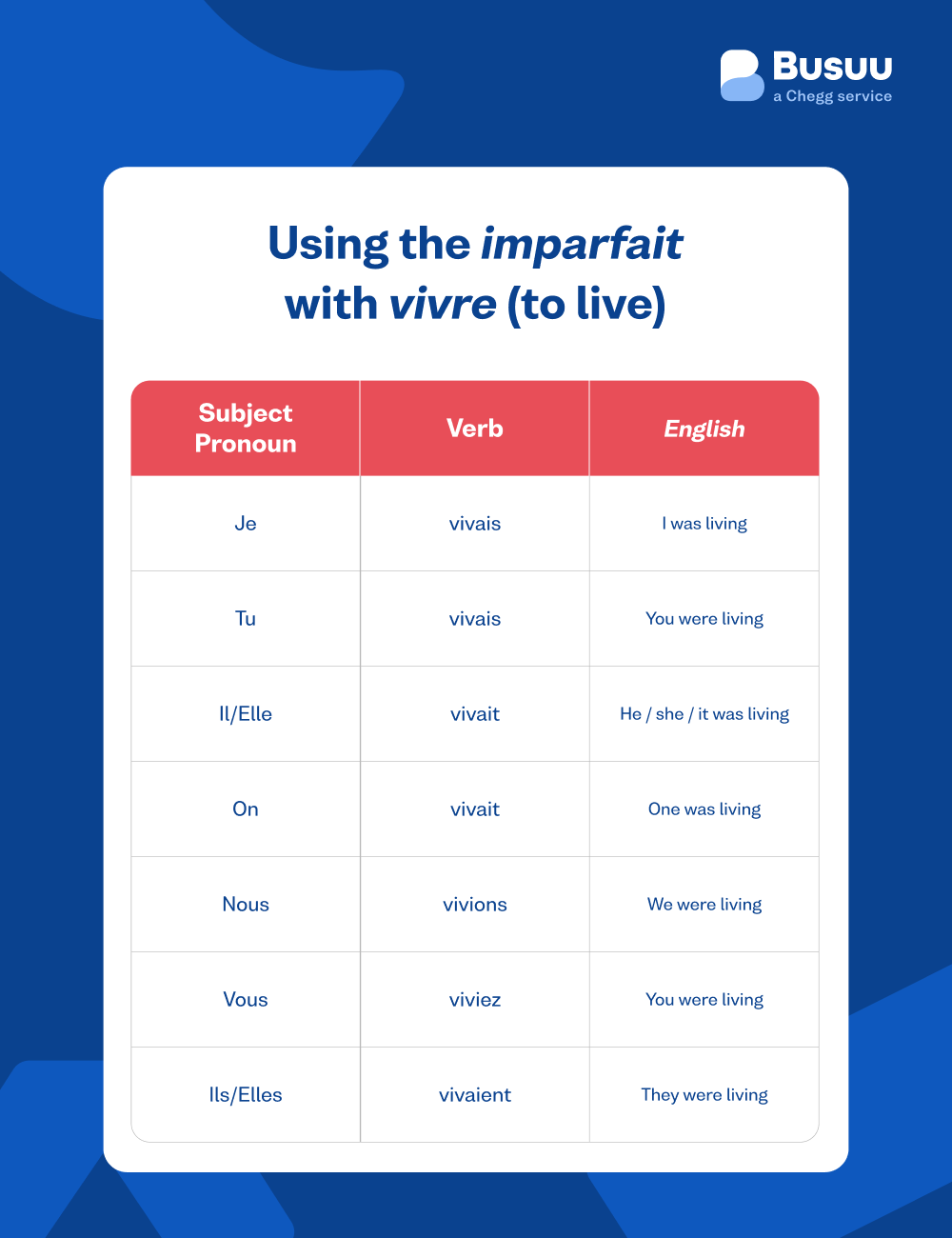
Using the imparfait with vivre (to live)
| Subject Pronoun | Verb | English |
|---|---|---|
| Je | vivais | I was living |
| Tu | vivais | You were living |
| Il / Elle | vivait | He / she / it was living |
| On | vivait | One was living |
| Nous | vivions | We were living |
| Vous | viviez | You were living |
| Ils / Elles | vivaient | They were living |
And guess what? Unlike the passé composé, the imparfait has very few irregular verbs! There is one irregular verb stem that you should be aware of for être.
See how it is conjugated in the table below:
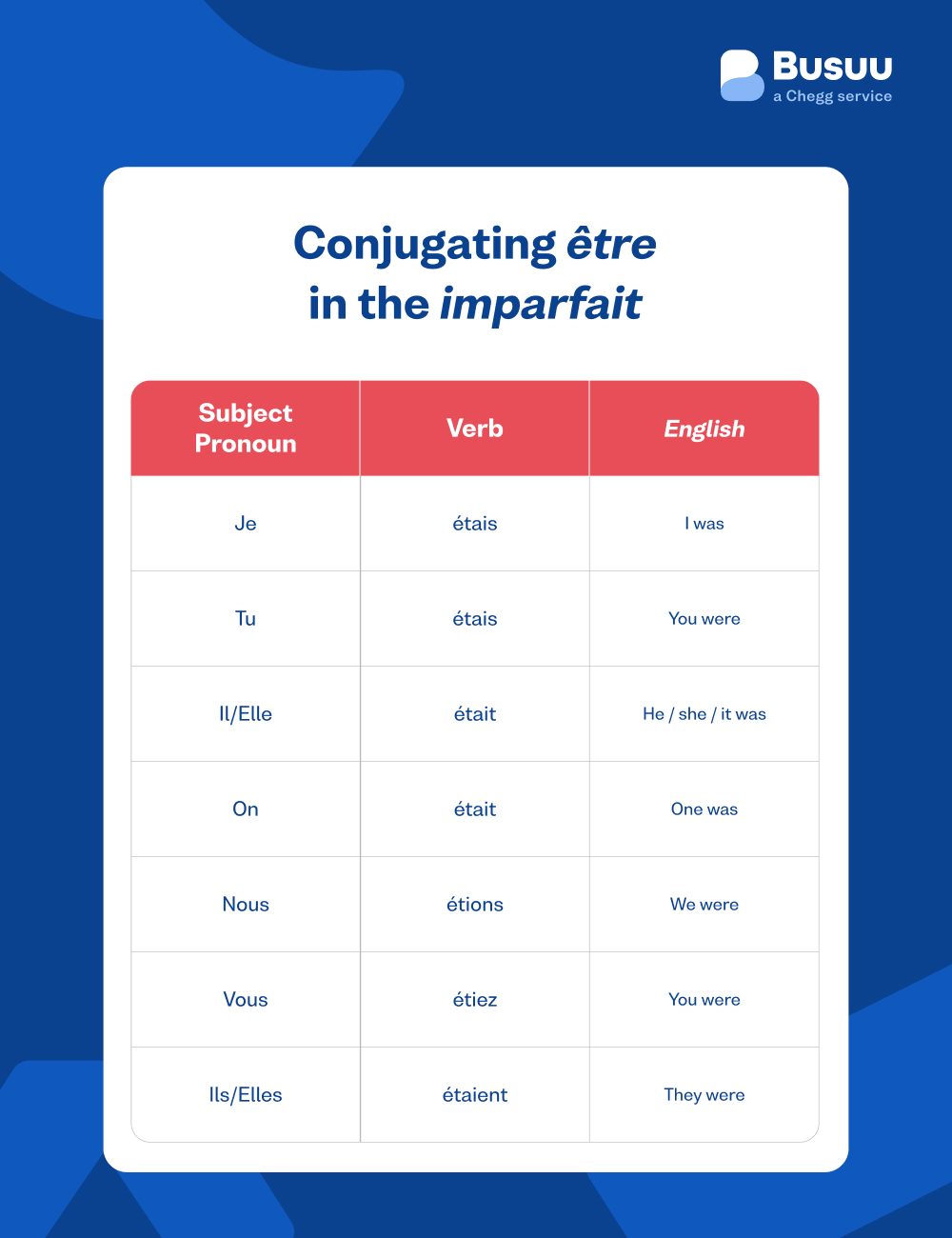
Conjugating être in the imparfait
| Subject Pronoun | Verb | English |
|---|---|---|
| J' | étais | I was |
| Tu | étais | You were |
| Il / Elle | était | He / she / it was |
| On | était | One was |
| Nous | étions | We were |
| Vous | étiez | You were |
| Ils / Elles | étaient | They were |
In summary
So when, exactly, should you use which tense? As a beginner in learning French, it can be tricky to know.
The best way to master the past tense in French, including both the passé composé and the imparfait, is to apply it and always remember that: “practice makes perfect”.
In addition to immersing yourself in the French language and reading as much as possible to see the past tenses in action, completing Busuu’s French language courses can really help you master the past tense in French.
But remember, you shouldn’t stay in the past too long, don’t forget to live in the present, and focus on the future too! We’re talking about tenses, of course!
Don’t get stuck in the passé (composé)!
There’s so much more to learn about French verb tenses for beginners.
Continue learning via Busuu’s free online courses, together with a community of native French speakers that can help you move on and help you become fluent in French in no time!

